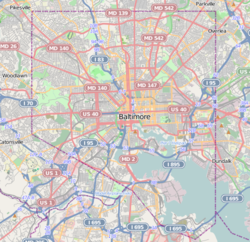Baltimore City Circuit Courthouses
| Clarence M. Mitchell, Jr., Courthouse | |
|---|---|
 |
|
| General information | |
| Architectural style | Greek Revival |
| Location | Downtown |
| Town or city | Baltimore City |
| Country | United States of America |
| Coordinates | 39°17′27″N 76°36′47″W / 39.2907°N 76.613°W |
| Construction started | 1896 |
| Completed | 1900 |
| Cost | $2.25 million |
| Client | Mayor and City Council of Baltimore |
| Technical details | |
| Size | 6 floors |
| Design and construction | |
| Architect | Wyatt and Nolting |
|
U.S. Post Office and Courthouse
|
|

Courthouse East, Baltimore, Maryland
|
|
| Location | 111 N. Calvert St., Baltimore, Maryland |
|---|---|
| Coordinates | 39°17′31″N 76°31′9″W / 39.29194°N 76.51917°WCoordinates: 39°17′31″N 76°31′9″W / 39.29194°N 76.51917°W |
| Area | 1.3 acres (0.53 ha) |
| Built | 1930 |
| Architect | Whetmore, James A.; Et al. |
| Architectural style | Classical Revival |
| NRHP Reference # | 77001530 |
| Added to NRHP | March 25, 1977 |
The Baltimore City Circuit Courthouses are state judicial facilities located in downtown Baltimore, Maryland. They face each other in the 100 block of North Calvert Street, between East Lexington Street on the north and East Fayette Street on the south across the Battle Monument Square, which held the original site of the first courthouse for Baltimore County and Town.
The first courthouse was built for new federal courts in the city. It was undercut in 1784 by Leonard Harbaugh with a pair of arched stone/brick arched piers to permit extension of Calvert Street to the north by passing underneath. A second federal courthouse of Georgian and Federal style architecture in red brick and limestone trim with a cupola was constructed to the west of old Courthouse Square (later renamed Battle Monument Square in honor of the War of 1812). It was sited on the northwest corner of North Calvert and facing East Lexington Street, completed in 1805. This second Courthouse was partially burned on 13 February 1835 during a spate of arson fires in the city during the bank riots that year, but it was soon repaired. An adjacent masonry building to the west was constructed for a Records Office.
A third courthouse, a federal district courthouse, was built 1896-1900, on the entire city block west of the Battle Monument. It is bounded by North Calvert Street on the east, East Lexington Street on the north, East Fayette Street on the south and St. Paul Street on the west.
The federal district courthouse was transferred to the state for its use after a new US Courthouse was constructed. Today the two historic main structures of the Maryland state judicial system in the City of Baltimore are the Clarence M. Mitchell, Jr. Courthouse and Courthouse East (the former Baltimore Post Office and U.S. Courthouse). Together they house the 30 judges of the 8th Judicial Circuit for the State of Maryland (Circuit Court of Maryland for Baltimore City). In addition to the criminal, civil and family (formerly orphans court) courts, these two courthouses also contain the Office of the State's Attorney for Baltimore City, the Clerk of the Circuit Court, the historic Baltimore City Bar Law Library, the City Sheriff's Office, the recently established Baltimore Courthouse and Law Museum (in the former Orphans Court chambers), the Pretrial Release Division of the Maryland Division of Corrections, several pretrial detention lockups, jury assembly rooms, land records, court medical offices and Masters hearing rooms.
...
Wikipedia



